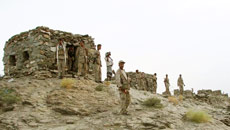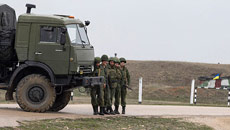How does a warming environment affect rainfall, cropping patterns, livelihoods? What could be the alternatives that people whose livelihoods are hit by the effects of climate change do to cope? An initiative by Britain and Canada seeks to study and tackle the effects of climate change in South Asia, in tandem with TERI and Jadavpur University in India and similar institutes in neighbouring Pakistan and Bangladesh.
Canada's International Development Research Centre (IDRC) and the UK's Department for International Development (DFID) have launched a research programme to "take a fresh approach to understanding climate change and find ways to adapt" in some of the hot spots.
The programme, named Collaborative Adaptation Research Initiative in Africa and Asia (CARIAA), a seven-year Canadian dollar 70 million research initiative, seeks to study the effects of climate change in three hot spots -- semi-arid regions, river deltas and Himalayan river basins.
K.S. Murali, senior programme officer with IDRC, told IANS: "We try to understand what are the different scenarios that can happen with one degree rise in temperature, with a two-degree rise in temperature."
In semi-arid regions, for example in Madhya Pradesh, where there is relatively high temperature and the rainfall hovers between 300-700 mm a year, rise in temperature can badly hit cropping patterns, said the researcher.
Semi-arid areas are dominated generally by dry land and agriculture is rain fed, or dependent on rainfall. "If the rain becomes erratic, or the area receives less rain, or it is not distributed equally, the cropping pattern is affected badly and cultivation is hit. Not just the summer temperature, the winter temperature too gets affected, and there is high rate of evaporation," he said.
The effects of climate change on river deltas, where the river meets the sea, and coastal estuaries are also to be studied. This includes the Sundarbans mangrove forest shared between India and Bangladesh.

Estuaries have very high productivity in the form of marine life and support the ecosystem.
"There is fear that climate change will lead to rise in sea temperature and in sea levels, which could lead to submergence of small islands over time. This could affect the Sundarbans too," he added.
Climate change would also affect another hot spot - the Himalayan river basins.
The Ganga and Brahmaputra rivers would be affected by snow melting. High temperatures will make the glacier snow melt faster. This will lead to more water flowing down the river, leading to flooding. The faster disappearance of glaciers is also of concern," he added.
"We try to understand how a degree rise in temperature can affect the hydrology of mountain rivers, the flow of the Ganga and the Brahmaputra. This will help predict river flow, how it will affect cropping and productivity and what alternatives can be offered to the locals," he said.
According to Murali, IDRC and DFID along with the partner organisations in the area try to address the climate change issues in tandem with the local people, the local communities, NGOs and policy makers. "Our aim is to benefit the people in solving the situation."
The Energy and Resources Institute (TERI) of India is involved in the study of climate change in Himalayan river basins. The Jadavpur University is involved in the study of deltas, while the Indian Institute for Human Settlements is working in the field of semi-arid areas. These institutes are working in partnership with institutes in Bangladesh and Pakistan to address the issues of climate change.





